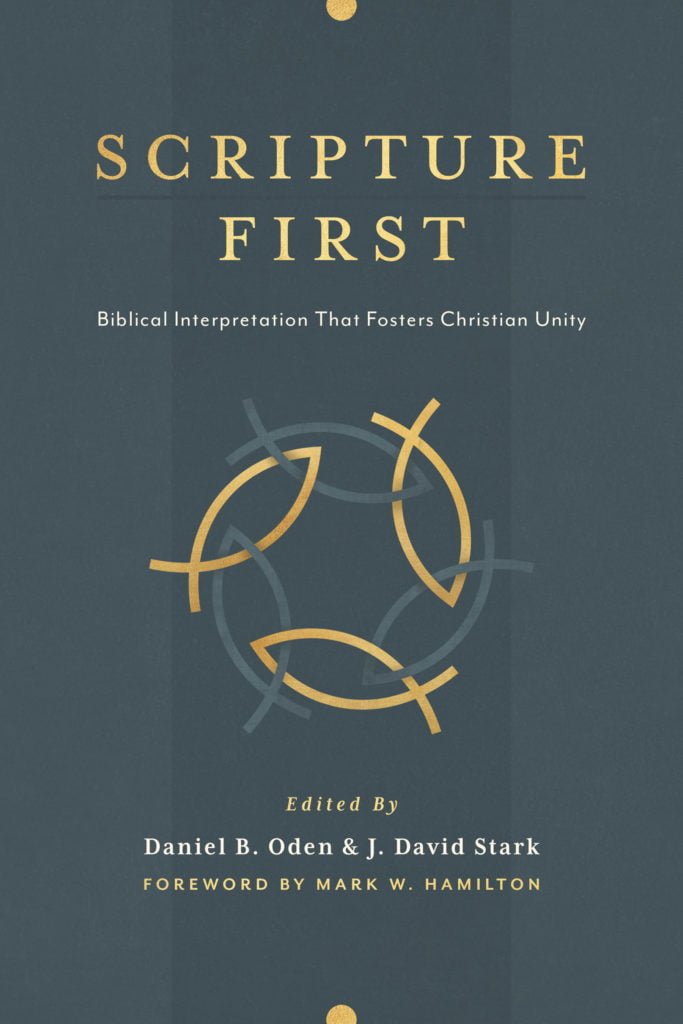How does Scripture read Scripture, and how can the church follow its lead?1
It’s easy, especially in the long shadow of the Reformation, to pit Scripture against tradition. But the Bible itself suggests there is a fundamental unity between Scripture and the tradition it embodies.
Rightly appreciating this unity sets the stage for more faithful and robust engagement with Scripture.
For the past few years, Daniel Oden (Harding University) and I have been curating a volume of essays to address this intersection between Scripture and its tradition.

Scripture First: Biblical Interpretation That Fosters Christian Unity argues for reading Scripture faithfully along with earliest Christian tradition as the church continues seeking to express its unity better.
The Restoration Movement was birthed from a holy desire to unify divided Christian communities under the authority of sacred Scripture.… These essays exhibit the best characteristics of such work. My hope is that Scripture First will be read widely to the edification and gentle provocation of all still committed to sharing in the mysterious work of the Father, reconciling all things in heaven and on earth in the Son through the Holy Spirit.
Joseph K. Gordon, Associate Professor of Theology, Johnson University
Scripture on Scripture
In reality, Scripture and tradition are not entirely separable. Scripture self-confessedly contains and canonizes certain traditions, thereby asking its readers to embrace them as well.
Scripture First’s two biblical essays particularly stress this point. Daniel Oden’s discusses how the Hebrew Bible develops and interprets its central confessions. My essay expands on this point via the early Jesus movement’s proclamation as summarized in 1 Cor 15:3b–5.
Scripture’s Tradition and Interpretation
Following these essays, two explore the history of interpretation.
Keith Stanglin (Austin Graduate School of Theology) analyzes Thomas Campbell’s thought and the enduring value of Christian biblical interpretation guided by a “rule of faith.”
Stephen Lawson (Austin Graduate School of Theology) highlights the tension reform efforts need to maintain in order to avoid short circuiting precisely aims they want to achieve.
These essays spark creative thought regarding how biblical interpretation impacts Christian unity.… A good read for anyone meditating on the concept of a rule of faith and its role in understanding Scripture and building up the body of Christ.
Susan Bubbers, Dean, The Center for Anglican Theology
Corporate Embodiment of Scripture’s Testimony
The volume’s final two essays take a practical turn.
Scott Adair (Harding University) cites baptism as a marker of Christian identity. On this basis, Scott highlights the hermeneutical relevance of the doctrinal and ethical content latent in baptismal practice.
Finally, drawing on thinkers like Martin Luther, Karl Barth, and Hans Urs von Balthasar, Lauren White (Lipscomb University) argues readers of Scripture cannot read well at a distance. Instead, readers must risk getting themselves caught up in the text’s witness and finding themselves directly addressed and formed by it.
[T]he authors convincingly advocate methods of interpreting Scripture that focus on the core affirmations of Christian faith—especially those proclaimed at and embodied in baptism. The object of godly biblical interpretation is the formation of the church into the image of Christ.
Douglas A. Foster, University Scholar in Residence, Abilene Christian University
Conclusion
6 Ways to Make Scripture First
In the end, I hope each of the essays will help you make Scripture first in your own practice. As the different essays suggest, this entails
- Following how the Hebrew Bible or Old Testament rehearses its core confessions,
- Reading Scripture through the core apostolic proclamation,
- Centering Scripture’s core testimony when interacting with others,
- Being constantly open to Scripture’s correction of interpretive missteps,
- Reading Scripture baptismally, and
- Engaging Scripture and the Christian community to seek formation in the image of the Son.
To Go Deeper …
Scripture First is now available through the publisher, Amazon, and other retailers.
And after you order, you can also claim several exclusive bonuses. These include
- A video of Daniel and me discussing the volume and the process of producing it from our perspective as editors,
- A video of Scott Adair walking you through the pedagogical exercise his essay proposes for summarizing the core content encapsulated in baptism, and
- A copy of the spreadsheet I developed to produce the modern author index.
After you’ve preordered Scripture First, just come to this page. Then, with your order number handy, click the button below, and drop that number in the bonus claim form along with your name and email address. I’ll then be in touch shortly with each of these downloads.

Leave a Reply